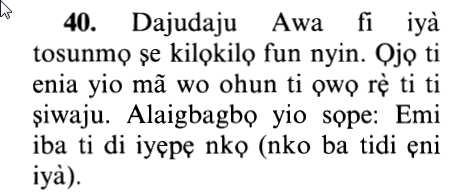78vs40
Select any filter and click on Go! to see results
إِنَّا أَنذَرْنَاكُمْ عَذَاباً قَرِيباً يَوْمَ يَنظُرُ الْمَرْءُ مَا قَدَّمَتْ يَدَاهُ وَيَقُولُ الْكَافِرُ يَا لَيْتَنِي كُنتُ تُرَاباً
Inna antharnakum AAathaban qareeban yawma yanthuru almaro ma qaddamat yadahu wayaqoolu alkafiru ya laytanee kuntu turaban
Index Terms
Click to play
Yoruba Translation

Hausa Translation
Lalle ne, Mũ, Mun yi muku gargaɗin azãba makusanciya, rãnar da mutum ke dũbi zuwa ga abin da hannãyensa suka aikata, kuma kafiri ya ce: "Kaitona, dã dai nã zama turɓãya!"
Asbabu n-Nuzuul (Occasions of Revelation)
The Day of Judgement is Near
Allah said,
إِنَّا أَنذَرْنَاكُمْ عَذَابًا قَرِيبًا ...
Verily, We have warned you of a near torment,
meaning, the Day of Judgment.
It is mentioned here to emphasize the fact that its occurrence has become close, because everything that is coming will certainly come to pass.
... يَوْمَ يَنظُرُ الْمَرْءُ مَا قَدَّمَتْ يَدَاهُ...
the Day when man will see that which his hands have sent forth,
meaning, all of his deeds will be presented to him -- the good and bad, and the old and new.
This is similar to Allah's statement,
وَوَجَدُواْ مَا عَمِلُواْ حَاضِرًا
And they will find all that they did, placed before them. (18:49)
It is also similar to His statement,
يُنَبَّأُ الإِنسَـنُ يَوْمَئِذِ بِمَا قَدَّمَ وَأَخَّرَ
On that Day man will be informed of what he sent forward, and what he left behind. (75:13)
Then Allah says,
.. وَيَقُولُ الْكَافِرُ يَا لَيْتَنِي كُنتُ تُرَابًا ﴿٤٠﴾
and the disbeliever will say: "Woe to me! Would that I were dust!''
meaning, the disbeliever on that Day will wish that he had only been dust in the worldly life.
He will wish that he had not been created and that he had never come into existence. This will be when he sees the torment of Allah and he looks at his wicked deeds that will be written down against him by the noble righteous scribes among angels.
It has been said that he will only wish for that when Allah passes judgement between all of the animals that were in the worldly life. He will rectify matters between them with His just wisdom that does not wrong anyone. Even the hornless sheep will be allowed to avenge itself against the sheep with horns. Then, when the judgement between them is finished, He (Allah) will say to them (the animals),
"Be dust.''
So they will all become dust.
Upon witnessing this the disbeliever will say, يَا لَيْتَنِي كُنتُ تُرَابًا (Would that I were dust!)
meaning, `I wish I was an animal so that I would be returned to dust.'
Something of similar meaning to this has been reported in the well-known Hadith about the Sur.
There are also narrations recorded from Abu Hurayrah, Abdullah bin Amr, and others concerning this.
This is the end of the Tafsir of Surah An-Naba'. And all praise and thanks are due to Allah. He is the Giver of success and protection from error.
" إنا أنذرناكم عذابا قريبا " يعني يوم القيامة لتأكد وقوعه صار قريبا لأن كل ما هو آت آت " يوم ينظر المرء ما قدمت يداه " يعرض عليه جميع أعماله خيرها وشرها قديمها وحديثها كقوله تعالى" ووجدوا ما عملوا حاضرا " وكقوله تعالى " ينبأ الإنسان يومئذ بما قدم وأخر " " ويقول الكافر يا ليتني كنت ترابا " أي يود الكافر يومئذ أنه كان في الدار الدنيا ترابا ولم يكن خلق ولا خرج إلى الوجود وذلك حين عاين عذاب الله ونظر إلى أعماله الفاسدة قد سطرت عليه بأيدي الملائكة السفرة الكرام البررة وقيل إنما يود ذلك حين يحكم الله بين الحيوانات التي كانت في الدنيا فيفصل بينها بحكمه العدل الذي لا يجور حتى إنه ليقتص للشاة الجماء من القرناء فإذا فرغ من الحكم بينها قال لها كوني ترابا فتصير ترابا فعند ذلك يقول الكافر " يا ليتني كنت ترابا " أي كنت حيوانا فأرجع إلى التراب وقد ورد معنى هذا في حديث الصور المشهور وورد فيه آثار عن أبي هريرة وعبد الله بن عمرو وغيرهما آخر تفسير سورة النبأ ولله الحمد والمنة وبه التوفيق والعصمة .
" إنا أنذرناكم " يا كفار مكة " عذابا قريبا " عذاب يوم القيامة الآتي , وكل آت قريب " يوم " ظرف لعذابا بصفته " ينظر المرء " كل امرئ " ما قدمت يداه " من خير وشر " ويقول الكافر يا " حرف تنبيه " ليتني كنت ترابا " يعني فلا أعذب يقول ذلك عندما يقول الله تعالى للبهائم بعد الاقتصاص من بعضها : كوني ترابا .
يخاطب كفار قريش ومشركي العرب ; لأنهم قالوا : لا نبعث . والعذاب عذاب الآخرة , وكل ما هو آت فهو قريب , وقد قال تعالى : " كأنهم يوم يرونها لم يلبثوا إلا عشية أو ضحاها " [ النازعات : 46 ] قال معناه الكلبي وغيره . وقال قتادة : عقوبة الدنيا ; لأنها أقرب العذابين . قال مقاتل : هي قتل قريش ببدر . والأظهر أنه عذاب الآخرة , وهو الموت والقيامة ; لأن من مات فقد قامت قيامته , فإن كان من أهل الجنة رأى مقعده من الجنة , وإن كان من أهل النار رأى الخزي والهوان ; ولهذا قال تعالى : " يوم ينظر المرء ما قدمت يداه "
I'raab - grammatical analysis of the Qur'an
ِنَّا»
إن واسمهاَنْذَرْناكُمْ»
ماض وفاعله ومفعوله الأول وَذاباً»
مفعول به ثان وَرِيباً»
صفة والجملة خبر إنا والجملة الاسمية مستأنفة. وَوْمَ»
ظرف زمانَ نْظُرُ»
مضارع ولْمَرْءُ»
فاعله وا»
مفعول به والجملة في محل جر بالإضافة وَدَّمَتْ يَداهُ»
ماض وفاعله والجملة صلة ماَ يَقُولُ الْكافِرُ»
مضارع وفاعله والجملة معطوفة على ما قبلها وا»
حرف تنبيه وَيْتَنِي»
حرف مشبه بالفعل والنون للوقاية والياء اسمها وُنْتُ»
كان واسمهاُراباً»
خبرها والجملة الفعلية خبر ليت والجملة الاسمية مقول القول
